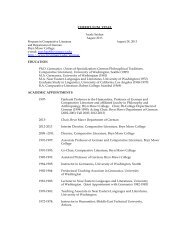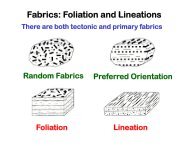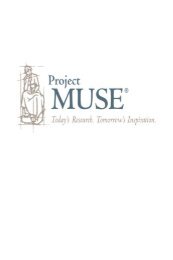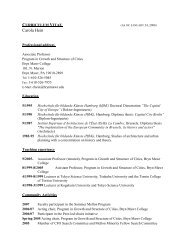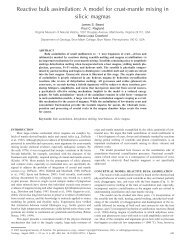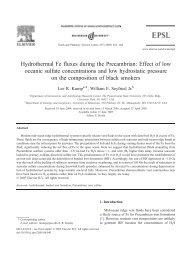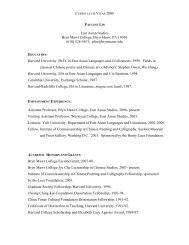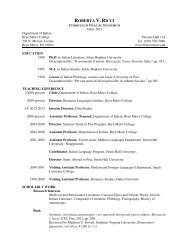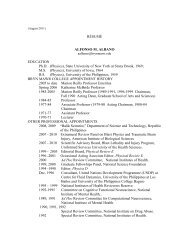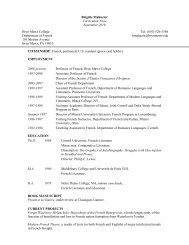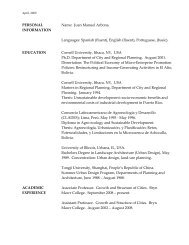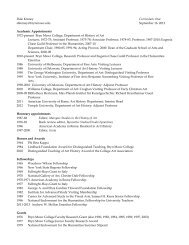Tearing Apart the Zagreus Myth - Bryn Mawr College
Tearing Apart the Zagreus Myth - Bryn Mawr College
Tearing Apart the Zagreus Myth - Bryn Mawr College
You also want an ePaper? Increase the reach of your titles
YUMPU automatically turns print PDFs into web optimized ePapers that Google loves.
EDMONDS: <strong>Tearing</strong> <strong>Apart</strong> <strong>the</strong> <strong>Zagreus</strong> <strong>Myth</strong> 67<br />
<strong>the</strong> individual groups that produced <strong>the</strong> tablets. A brief analysis of some of <strong>the</strong><br />
statements on <strong>the</strong> tablet from Thurii quoted at <strong>the</strong> beginning of this essay may<br />
serve as a demonstration.<br />
The claim of <strong>the</strong> deceased to be ÍmÀn gènoj îlbion, of your blessed race,<br />
when addressing a deity is by no means impossible for a mortal outside <strong>the</strong><br />
framework of <strong>the</strong> <strong>Zagreus</strong> anthropogony. As mainstream a poet as Hesiod says he<br />
will tell how <strong>the</strong> gods and man came from <strong>the</strong> same origin, ±j åmìqen gegˆasi<br />
qeoÈ qnhtoÐ t' Šnqrwpoi. 97 By claiming to be of <strong>the</strong> gènoj of <strong>the</strong> gods, <strong>the</strong><br />
deceased is employing a familiar mythic element to make a claim that transcends<br />
<strong>the</strong> clan politics of her contemporary world, where status is based on family<br />
position and <strong>the</strong> confinements of various social hierarchies. The deceased instead<br />
lays claim to kinship with <strong>the</strong> gods, recalling <strong>the</strong> ideal of <strong>the</strong> time before <strong>the</strong><br />
separation of mortals and immortals. Hesiod’s description of <strong>the</strong> unity of men and<br />
gods, which ended with <strong>the</strong> divisive sacrifice at Mekone, is only <strong>the</strong> most obvious<br />
of <strong>the</strong> numerous myths of an idealized primeval communion of men and gods. 98<br />
The deceased also claims to have paid <strong>the</strong> penalty for unjust deeds. These<br />
unjust deeds may ei<strong>the</strong>r be those of <strong>the</strong> deceased herself or those committed by<br />
some ancestor, as Plato’s discussion of purificatory rituals for unjust deeds in <strong>the</strong><br />
Republic shows: “For beggar priests and prophets go to <strong>the</strong> doors of <strong>the</strong> rich and<br />
persuade <strong>the</strong>m that <strong>the</strong>y have <strong>the</strong> power from <strong>the</strong> gods to perform sacrifices and<br />
spells. If <strong>the</strong>y or one of <strong>the</strong>ir ancestors has done something unjust, <strong>the</strong>y have <strong>the</strong><br />
power to heal it with pleasurable things and festivals.” 99 But Plato’s discussion<br />
also shows that <strong>the</strong>se ancestors are unlikely to be <strong>the</strong> Titans as <strong>the</strong> universal<br />
ancestors of mankind, for every mortal has ancestors who were less than perfectly<br />
just. The use of this mythic element in <strong>the</strong> tablets would have evoked a wide<br />
range of traditional stories of individuals paying <strong>the</strong> penalty not only for <strong>the</strong>ir<br />
own crimes, but for those of <strong>the</strong>ir ancestors.<br />
The claim of <strong>the</strong> deceased to have been struck by lightning also admits<br />
of more interpretations than <strong>the</strong> punishment of <strong>the</strong> Titans, for <strong>the</strong> idea has a<br />
number of interesting mythic resonances. The Titans were by no means <strong>the</strong> only<br />
97. Hesiod Op. 108. Closer to <strong>the</strong>se tablets in time and place, Pindar begins <strong>the</strong> Sixth Nemean<br />
Ode by affirming <strong>the</strong> same idea, ën ‚ndrÀn, ën qeÀn gènoj; âk mi j dà pnèomen maträj<br />
‚mfìteroi (1–2). A different formulation of <strong>the</strong> same idea may be found in <strong>the</strong> B tablets’ formula of<br />
self-identification, “I am <strong>the</strong> child of earth and starry heaven,” a Hesiodic phrase that would apply<br />
not only to <strong>the</strong> Titans but to all of <strong>the</strong> later generations of gods (and possibly mortals). Cf., Hesiod<br />
Theog. 105–106.<br />
98. Theog. 535ff.: cunaÈ g€r tìte daØtej êsan, cunoÈ dà qìwkoi ‚qanˆtoisi qeoØsi<br />
kataqnhtoØj t' ‚nqr¸poij. Cf. Eoiae fr. 1.6–7 Merkelbach-West; cf. also <strong>the</strong> feasting of Tantalus<br />
and Ixion with <strong>the</strong> gods.<br />
99. ‚gÔrtai dà kaÈ mˆnteij âpÈ plousÐwn qÔraj Êìntej peÐqousin ±j êsti par€ sfÐsi<br />
dÔnamij âk qeÀn prozomènh qusÐaj te kaÈ âpwúdaØj, eÒte ti ‚dÐkhmˆ tou gègonen aÎtoÜ £<br />
progìnwn, ‚keØsqai meq' donÀn te kaÈ áortÀn (Republic 364bc; cf. 364e-5a, 366ab). The<br />
o<strong>the</strong>r tablets from Thurii, A1 and A4, make no mention of paying a penalty, nor do any of <strong>the</strong> tablets<br />
in <strong>the</strong> B series. The Pelinna tablets refer to Bacchios freeing <strong>the</strong> initiate, perhaps meaning that she,<br />
like <strong>the</strong> initiate of <strong>the</strong> Pherai tablet, need not pay a penalty.




